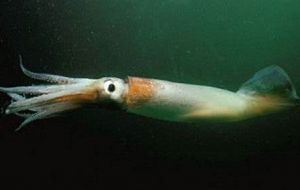MercoPress. South Atlantic News Agency
Illex Squid: correlation between abundance and sea surface temperatures; Taiwanese experience 1998/2018
 The fishing ground mainly extended from 34°S to 55°S and from 50°W to 70°W, approximately covered distributional range of the Argentine shortfin squid Illex
The fishing ground mainly extended from 34°S to 55°S and from 50°W to 70°W, approximately covered distributional range of the Argentine shortfin squid Illex ScienceDirect (*) site has published a most interesting study on fishing trends, particularly on the Illex Argentines in the Southwest Atlantic, based on squid catches calculated from daily logbooks recorded by the Taiwanese squid-jigging vessels from 1998 to 2018 across the open sea east of Argentina and north of the exclusive economic zones of the Falkland Islands in the Southwest Atlantic, which was a quality-controlled compilation of regional fisheries data.
Anthropogenic shifts in seas are reshaping fishing trends, with significant implications for aquatic food sources throughout this century. Examining a 21-year abundance dataset of Argentine shortfin squids Illex argentines paired with a regional oceanic analysis, we noted strong correlations between squid annual abundance and sea surface temperature (SST) in January and February and eddy kinetic energy (EKE) from March to May in the Southwest Atlantic.
A deeper analysis revealed combined ocean-atmosphere interactions, pinpointed as the primary mode in a rotated empirical orthogonal function analysis of SST. This pattern produced colder SST and amplified EKE in the surrounding seas, factors crucial for the unique life stages of squids. Future projections from the CMIP6 archive indicated that this ocean-atmosphere pattern, referred to as the Atlantic symmetric pattern, would persist in its cold SST phase, promoting increased squid abundance. However, rising SSTs due to global warming might counteract the abundance gains. Our findings uncover a previously unrecognized link between squids and specific environmental conditions governed by broader ocean-atmosphere interactions in the Southwest Atlantic. Integrating these insights with seasonal and decadal projections can offer invaluable information to stakeholders in squid fisheries and marine conservation under a changing climate.
Squid abundance
Time series squid catches were calculated from daily logbooks recorded by the Taiwanese squid-jigging vessels from 1998 to 2018 across the open sea east of Argentina and north of the exclusive economic zones of the Falkland Islands in the Southwest Atlantic, which was a quality-controlled compilation of regional fisheries data. The fishing ground mainly extended from 34°S to 55°S and from 50°W to 70°W, where approximately covered distributional range of the Argentine shortfin squid Illex
Identified time-series patterns and large-scale circulation roles
Time series of Illex argentinus abundance in the Southwest Atlantic showed monthly dynamics and annual quasi-cyclic fluctuations. The highest abundance appeared in 1999, 2007, 2014 and 2015, whereas the lowest abundance occurred in 2004, 2009, 2010 and 2016. To minimize effects of length of the fishing season, merely the summed daily squid abundance during the main fishing period, i.e. from March to May (MAM), representing 34.4%–94.1% of the total catch by the Taiwanese squid-jigging.
The authors of the report demonstrated how recent oceanic and atmospheric changes would continuously alter temporal-spatial trends of squid annual abundance in the Southwest Atlantic. Did Illex argentinus still benefit from a changing sea environment, being proliferating populations? We examined this issue using more recent multidecadal abundance trends of squids with spatial aspects, rather the typical practice of examining long-term, usually over a quarter century, species trends collectively.
Credit authorship contribution statement
Chia-Ying Ko: Writing – review & editing, Writing – original draft, Project administration, Methodology, Investigation, Funding acquisition, Formal analysis, Data curation, Conceptualization. Yu-Chi Lee: Writing – review & editing, Writing – original draft, Visualization, Methodology, Formal analysis, Data curation, Conceptualization. Yi-Chi Wang: Writing – review & editing, Writing – original draft, Project administration, Methodology, Formal analysis, Data curation, Conceptualization.
Declaration of competing interest
The authors declare that they have no known competing financial interests or personal relationships that could have appeared to influence the work reported in this paper.
Acknowledgments
We thank the crews and staffs of Taiwanese squid-jigging vessels and the Taiwan Squid and Saur Fisheries Association and anonymous reviewers for their insightful comments and criticisms. This research was funded by the Fisheries Agency, Council of Agriculture, Executive Yuan (grant numbers 109AS-9.1.4-FA-F1, 110AS-6.1.1-FA-F6 and 111AS-6.4.1-FAF6) and National Science and Technology Council (grant numbers MOST 111-2636-B-002-022- and NSTC 112-2636-B-002-013-). We thank to National Center for Science
(*) ScienceDirect is an essential information resource for over 19,000,000 scientists worldwide, and home to many respected journals and prestigious society titles.




Top Comments
Disclaimer & comment rulesCommenting for this story is now closed.
If you have a Facebook account, become a fan and comment on our Facebook Page!